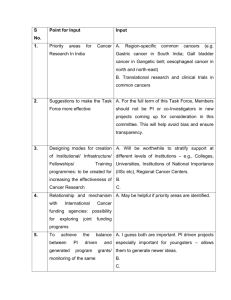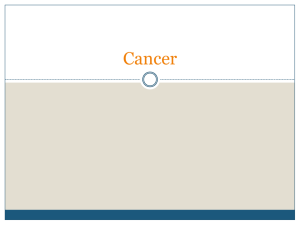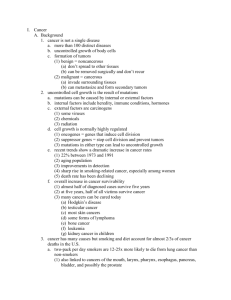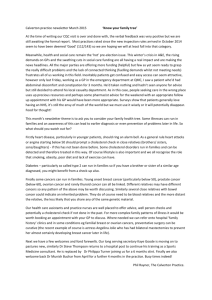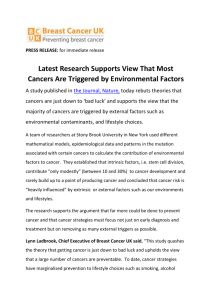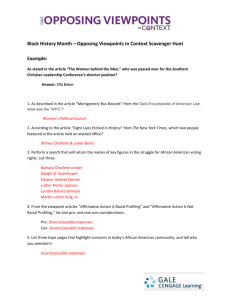Should Racial Profiling Play a Role in Cancer Prognosis?
advertisement
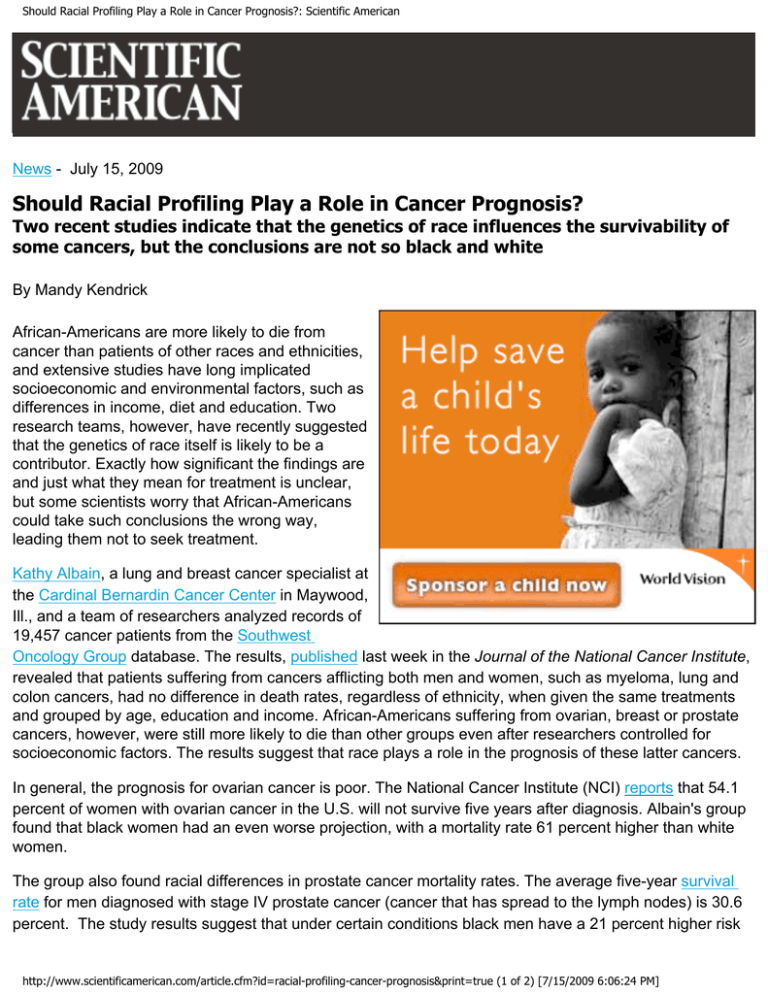
Should Racial Profiling Play a Role in Cancer Prognosis?: Scientific American News - July 15, 2009 Should Racial Profiling Play a Role in Cancer Prognosis? Two recent studies indicate that the genetics of race influences the survivability of some cancers, but the conclusions are not so black and white By Mandy Kendrick African-Americans are more likely to die from cancer than patients of other races and ethnicities, and extensive studies have long implicated socioeconomic and environmental factors, such as differences in income, diet and education. Two research teams, however, have recently suggested that the genetics of race itself is likely to be a contributor. Exactly how significant the findings are and just what they mean for treatment is unclear, but some scientists worry that African-Americans could take such conclusions the wrong way, leading them not to seek treatment. Kathy Albain, a lung and breast cancer specialist at the Cardinal Bernardin Cancer Center in Maywood, Ill., and a team of researchers analyzed records of 19,457 cancer patients from the Southwest Oncology Group database. The results, published last week in the Journal of the National Cancer Institute, revealed that patients suffering from cancers afflicting both men and women, such as myeloma, lung and colon cancers, had no difference in death rates, regardless of ethnicity, when given the same treatments and grouped by age, education and income. African-Americans suffering from ovarian, breast or prostate cancers, however, were still more likely to die than other groups even after researchers controlled for socioeconomic factors. The results suggest that race plays a role in the prognosis of these latter cancers. In general, the prognosis for ovarian cancer is poor. The National Cancer Institute (NCI) reports that 54.1 percent of women with ovarian cancer in the U.S. will not survive five years after diagnosis. Albain's group found that black women had an even worse projection, with a mortality rate 61 percent higher than white women. The group also found racial differences in prostate cancer mortality rates. The average five-year survival rate for men diagnosed with stage IV prostate cancer (cancer that has spread to the lymph nodes) is 30.6 percent. The study results suggest that under certain conditions black men have a 21 percent higher risk http://www.scientificamerican.com/article.cfm?id=racial-profiling-cancer-prognosis&print=true (1 of 2) [7/15/2009 6:06:24 PM] Should Racial Profiling Play a Role in Cancer Prognosis?: Scientific American of dying from stage IV prostate cancer than white men. In a second study, Idan Menashe and his colleagues at the NCI analyzed data from 244,786 women diagnosed with breast cancer between 1990 and 2003. Approximately 23 percent of all breast cancers fall into the so-called estrogen receptor negative category, which has a poor prognosis. Menashe's group found that a larger percentage of black women (29.6 percent compared with 17.3 percent of white women) had this variety of breast cancer and consequently higher mortality rates. Both studies suggest that biological differences exist between races that may affect cancer outcomes. Otis Brawley, the chief medical officer for the American Cancer Society, acknowledges that some racial profiling may be beneficial but believes that in the long run, concentrating efforts on understanding racial differences is likely to hold medical advances back. He mentions Bidil, the first (and only) drug ever approved based solely on race, as an example. The drug to treat heart failure was authorized for use only by black men but could also have been used by the small percentage of white men who had the same genetic impairment that leads to cardiovascular damage. But because of financial reasons, the drug's maker at the time chose to market it to black men and tested it only on them. Additionally, Brawley worries that African-Americans, specifically black women with breast cancer, may become confused by the results from the two studies: "She may think, 'I shouldn't get treated because I am simply going to die.'" But in reality, Brawley says, that is not the message. Menashe's results reveal that although mortality rates between black and white women differ, percentages for both decreased from 1990 to 2004, and the majority of all breast cancers (approximately 77 percent) are estrogen receptor positive (those with a favorable prognosis.) One final concern Brawley has with the interpretations of the results, specifically in the Albain study, is that although the researchers were able to account for subjects' socioeconomic condition at the time of treatment, they could not account for a patient's status years prior to the diagnosis, the time when environmental surroundings influence cancer risks. He notes that black children in the U.S. on average consume more calories than white children, that black girls start menstruating at a younger age than their white counterparts (diet plays a strong role in menarche), and 35 percent of black women in the U.S. are obese compared with 20 percent of white women. All these factors can influence susceptibility to cancers independent of race, but they could not be accounted for in this study. In the future, Brawley hopes to see research focus on understanding genetic impairments that give rise to disease rather than on racial differences. He suggests in an editorial accompanying the two papers that researchers cannot ignore previous analysis on socioeconomic influences and states that adequate health care for all is a must for decreasing disparities. http://www.scientificamerican.com/article.cfm?id=racial-profiling-cancer-prognosis&print=true (2 of 2) [7/15/2009 6:06:24 PM]

